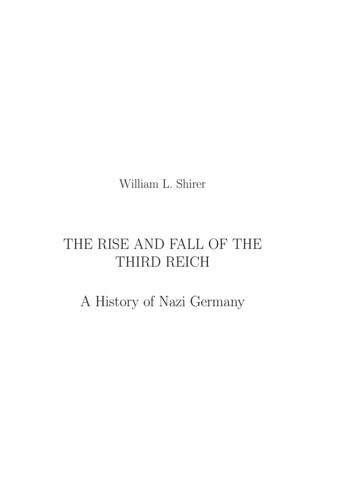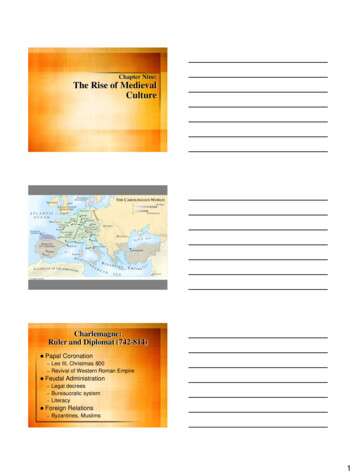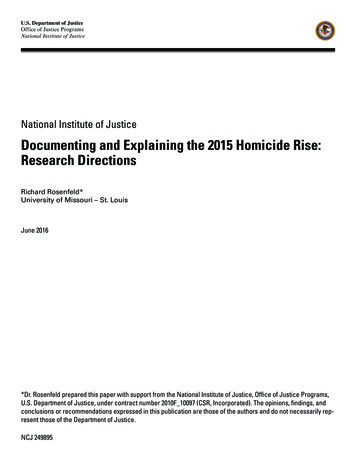
Transcription
William L. ShirerTHE RISE AND FALL OF THETHIRD REICHA History of Nazi Germany
THE RISE AND FALLOF THE THIRD REICH William L. Shirer ranks as one of the greatest of all American correspondents. He lived and worked in Paris, Berlin, Vienna and Rome. But it wasabove all as correspondent in Germany for the Chicago Tribune and later theColumbia Broadcasting System that his reputation was established. He subsequently wrote The Rise and Fall of the Third Reich, which is hailed as a classic,and after the war he was awarded the Legion d’Honneur. In the post-war yearshe wrote in a variety of fields, and in his seventies he learned Russian, publishinga biography of Tolstoy at the age of 89. He died in 1994. His Berlin broadcastswere published posthumously by Hutchinson in 1999. Formatted in LAT X by motor89hotmail.com. Any comments/corrections appreciated –Erelease V1.0
It was Hitler’s boast that the Third Reich would last a thousand years.Instead it lasted only twelve. But into its short life was packed the most cataclysmic series of events that Western civilisation has ever known.William Shirer is one of the very few historians to have gained full accessto the secret German archives which the Allies captured intact. He was alsopresent at the Nuremberg trials.’I can think of no book which I would rather put in the hands ofanyone who wanted to find out what happened in Germany between1930 and 1945, and why the history of those years should never beforgotten.’ – Alan BullockMonumental – perfectly balanced, yet all the time marked with thepersonality and understanding of the author. It’s is a great book; agreat record.’ – Bernard Levin’The standard, indeed the classic, history of Nazism. We should bethankful to the historian whose solid work will permanently preservethe truth.’ – Hugh Trevor-Roper
iv
ContentsFOREWORDviiTHE RISE OF ADOLF HITLER11 BIRTH OF THE THIRD REICH32 BIRTH OF THE NAZI PARTY273 VERSAILLES, WEIMAR AND THE BEER HALL PUTSCH 494 THE MIND OF HITLER AND THE ROOTS OF THE THIRDREICH73TRIUMPH AND CONSOLIDATION1025 THE ROAD TO POWER: 1925-311036 THE LAST DAYS OF THE REPUBLIC 1931-331337 THE NAZIFICATION OF GERMANY: 1933-341678 LIFE IN THE THIRD REICH: 1933-37205THE ROAD TO WAR2459 THE FIRST STEPS: 1934-3724710 STRANGE, FATEFUL INTERLUDE: THE FALLBLOMBERG, FRITSCH, NEURATH AND SCHACHTOF27511 ANSCHLUSS: THE RAPE OF AUSTRIA28712 THE ROAD TO MUNICH31913 CZECHOSLOVAKIA CEASES TO EXIST38314 THE TURN OF POLAND407v
15 THE NAZI-SOVIET PACT45916 THE LAST DAYS OF PEACE48917 THE LAUNCHING OF WORLD WAR II535WAR: EARLY VICTORIES AND THE TURNINGPOINT55918 THE FALL OF POLAND56119 SITZKRIEG IN THE WEST56920 THE CONQUEST OF DENMARK AND NORWAY60521 VICTORY IN THE WEST64122 OPERATION SEA LION: THE THWARTED INVASION OFBRITAIN68123 BARBAROSSA: THE TURN OF RUSSIA71324 A TURN OF THE TIDE76725 THE TURN OF THE UNITED STATES78326 THE GREAT TURNING POINT: 1942 STALINGRAD ANDEL ALAMEIN813BEGINNING OF THE END84127 THE NEW ORDER84328 THE FALL OF MUSSOLINI89529 THE ALLIED INVASION OF WESTERN EUROPE ANDTHE ATTEMPT TO KILL HITLER911THE FALL OF THE THIRD REICH30 THE CONQUEST OF GERMANY97297331 GOETTERDAEMMERUNG: THE LAST DAYS OF THETHIRD REICH99332 A BRIEF EPILOGUE102333 AFTERWORD1027vi
I have often felt a bitter sorrow at the thoughtof the German people, which is so estimablein the individual and so wretched in the generality. . .GOETHEHitler was the fate of Germany and this fatecould not be stayed.FIELD MARSHAL WALTHER VON BRAUCHITSCH,Commander in Chief of the German Army, 1938-41A thousand years will pass and the guilt of Germanywill not be erased.HANS FRANK, Governor General of Poland,before he was hanged at NurembergThose who do not remember the pastare condemned to relive it.SANTAYANAvii
viiiTHE RISE AND FALL OF THE THIRD REICHFOREWORDThough I lived and worked in the Third Reich during the first half of itsbrief life, watching at first hand Adolf Hitler consolidate his power as dictatorof this great but baffling nation and then lead it off to war and conquest, thispersonal experience would not have led me to attempt to write this book hadthere not occurred at the end of World War II an event unique in history.This was the capture of most of the confidential archives of the German government and all its branches, including those of the Foreign Office, the Army andNavy, the National Socialist Party and Heinrich Himmler’s secret police. Neverbefore, I believe, has such a vast treasure fallen into the hands of contemporaryhistorians. Hitherto the archives of a great state, even when it was defeated inwar and its government overthrown by revolution, as happened to Germany andRussia in 1918, were preserved by it, and only those documents which servedthe interests of the subsequent ruling regime were ultimately published.The swift collapse of the Third Reich in the spring of 1945 resulted in thesurrender not only of a vast bulk of its secret papers but of other pricelessmaterial such as private diaries, highly secret speeches, conference reports andcorrespondence, and even transcripts of telephone conversations of the Nazileaders tapped by a special office set up by Hermann Goering in the Air Ministry.General Franz Haider, for instance, kept a voluminous diary, jotted downin Gabelsberger shorthand not only from day to day but from hour to hourduring the day. It is a unique source of concise information for the periodbetween August 14, 1939, and September 24, 1942, when he was Chief of theArmy General Staff and in daily contact with Hitler and the other leaders ofNazi Germany. It is the most revealing of the German diaries, but there areothers of great value, including those of Dr. Joseph Goebbels, the Ministerof Propaganda and close party associate of Hitler, and of General Alfred Jodl,Chief of Operations of the High Command of the Armed Forces (OKW). Thereare diaries of the OKW itself and of the Naval High Command. Indeed the sixtythousand files of the German Naval Archives, which were captured at SchlossTambach near Coburg, contain practically all the signals, ships’ logs, diaries,memoranda, etc., of the German Navy from April 1945, when they were found,back to 1868, when the modern German Navy was founded.The 485 tons of records of the German Foreign Office, captured by the U.S.First Army in various castles and mines in the Harz Mountains just as theywere about to be burned on orders from Berlin, cover not only the period ofthe Third Reich but go back through the Weimar Republic to the beginningof the Second Reich of Bismarck. For many years after the war tons of Nazidocuments lay sealed in a large U.S. Army warehouse in Alexandria, Virginia,our government showing no interest in even opening the packing cases to seewhat of historical interest might lie within them. Finally in 1955, ten years aftertheir capture, thanks to the initiative of the American Historical Associationand the generosity of a couple of private foundations, the Alexandria paperswere opened and a pitifully small group of scholars, with an inadequate staffand equipment, went to work to sift through them and photograph them beforethe government, which was in a great hurry in the matter, returned them toGermany. They proved a rich find.So did such documents as the partial stenographic record of fifty-one”Fuehrer Conferences” on the daily military situation as seen and discussed
FOREWORDixat Hitler’s headquarters, and the fuller text of the Nazi warlord’s table talkwith his old party cronies and secretaries during the war; the first of these wasrescued from the charred remains of some of Hitler’s papers at Berchtesgadenby an intelligence officer of the U.S. 101st Airborne Division, and the secondwas found among Martin Bormann’s papers.Hundreds of thousands of captured Nazi documents were hurriedly assembled at Nuremberg as evidence in the trial of the major Nazi war criminals.While covering the first part of that trial I collected stacks of mimeographedcopies and later the forty-two published volumes of testimony and documents,supplemented by ten volumes of English translations of many important papers.The text of other documents published in a fifteen-volume series on the twelvesubsequent Nuremberg trials was also of value, though many papers and muchtestimony were omitted.Finally, in addition to this unprecedented store of documents, there are therecords of the exhaustive interrogation of German military officers and party andgovernment officials and their subsequent testimony under oath at the variouspostwar trials, which provide material the like of which was never available, Ibelieve, from such sources after previous wars.I have not read, of course, all of this staggering amount of documentation– it would be far beyond the power of a single individual. But I have workedmy way through a considerable part of it, slowed down, as all toilers in this richvineyard must be, by the lack of any suitable indexes.It is quite remarkable how little those of us who were stationed in Germanyduring the Nazi time, journalists and diplomats, really knew of what was goingon behind the facade of the Third Reich. A totalitarian dictatorship, by its verynature, works in great secrecy and knows how to preserve that secrecy from theprying eyes of outsiders. It was easy enough to record and describe the bare,exciting and often revolting events in the Third Reich: Hitler’s accession topower, the Reichstag fire, the Roehm Blood Purge, the Anschluss with Austria,the surrender of Chamberlain at Munich, the occupation of Czechoslovakia, theattacks on Poland, Scandinavia, the West, the Balkans and Russia, the horrorsof the Nazi occupation and of the concentration camps and the liquidation ofthe Jews. But the fateful decisions secretly made, the intrigues, the treachery,the motives and the aberrations which led up to them, the parts played bythe principal actors behind the scenes, the extent of the terror they exercisedand their technique of organizing it – all this and much more remained largelyhidden from us until the secret German papers turned up.Some may think that it is much too early to try to write a history of theThird Reich, that such a task should be left to a later generation of writersto whom time has given perspective. I found this view especially prevalent inFrance when I went to do some research there. Nothing more recent than theNapoleonic era, I was told, should be tackled by writers of history.There is much merit in this view. Most historians have waited fifty yearsor a hundred, or more, before attempting to write an account of a country,an empire, an era. But was this not principally because it took that long forthe pertinent documents to come to light and furnish them with the authenticmaterial they needed? And though perspective was gained, was not somethinglost because the authors necessarily lacked a personal acquaintance with the lifeand the atmosphere of the times and with the historical figures about whichthey wrote?
xTHE RISE AND FALL OF THE THIRD REICHIn the case of the Third Reich, and it is a unique case, almost all of thedocumentary material became available at its fall, and it has been enrichedby the testimony of all the surviving leaders, military and civilian, in someinstances before their death by execution. With such incomparable sourcesso soon available and with the memory of life in Nazi Germany and of theappearance and behavior and nature of the men who ruled it, Adolf Hitlerabove all, still fresh in my mind and bones, I decided, at any rate, to make anattempt to set down the history of the rise and fall of the Third Reich.”I lived through the whole war,” Thucydides remarks in his History of thePeloponnesian War, one of the greatest works of history ever written, ”being ofan age to comprehend events and giving my attention to them in order to knowthe exact truth about them.”I found it extremely difficult and not always possible to learn the exacttruth about Hitler’s Germany. The avalanche of documentary material helpedone further along the road to truth than would have seemed possible twentyyears ago, but its very vastness could often be confusing. And in all humanrecords and testimony there are bound to be baffling contradictions.No doubt my own prejudices, which inevitably spring from my experienceand make-up, creep through the pages of this book from time to time. I detesttotalitarian dictatorships in principle and came to loathe this one the more Ilived through it and watched its ugly assault upon the human spirit. Nevertheless, in this book I have tried to be severely objective, letting the facts speakfor themselves and noting the source for each. No incidents, scenes or quotations stem from the imagination; all are based on documents, the testimony ofeyewitnesses or my own personal observation. In the half-dozen or so occasionsin which there is some speculation, where the facts are missing, this is plainlylabeled as such.My interpretations, I have no doubt, will be disputed by many. That isinevitable, since no man’s opinions are infallible. Those that I have venturedhere in order to add clarity and depth to this narrative are merely the best Icould come by from the evidence and from what knowledge and experience Ihave had.Adolf Hitler is probably the last of the great adventurer-conquerors in thetradition of Alexander, Caesar and Napoleon, and the Third Reich the lastof the empires which set out on the path taken earlier by France, Rome andMacedonia. The curtain was rung down on that phase of history, at least, by thesudden invention of the hydrogen bomb, of the ballistic missile and of rocketsthat can be aimed to hit the moon.In our new age of terrifying, lethal gadgets, which supplanted so swiftly theold one, the first great aggressive war, if it should come, will be launched bysuicidal little madmen pressing an electronic button. Such a war will not lastlong and none will ever follow it. There will be no conquerors and no conquests,but only the charred bones of the dead on an uninhabited planet.
Book One:?THE RISE OF ADOLF HITLER
2THE RISE AND FALL OF THE THIRD REICH
Chapter 1BIRTH OF THE THIRDREICHOn the very eve of the birth of the Third Reich a feverish tension grippedBerlin. The Weimar Republic, it seemed obvious to almost everyone, was aboutto expire. For more than a year it had been fast crumbling. General Kurt vonSchleicher, who like his immediate predecessor, Franz von Papen, cared littlefor the Republic and less for its democracy, and who, also like him, had ruledas Chancellor by presidential decree without recourse to Parliament, had cometo the end of his rope after fifty-seven days in office.On Saturday, January 28, 1933, he had been abruptly dismissed by theaging President of the Republic, Field Marshal von Hindenburg. Adolf Hitler,leader of the National Socialists, the largest political party in Germany, wasdemanding for himself the chancellorship of the democratic Republic he hadsworn to destroy.The wildest rumors of what might happen were rife in the capital that fatefulwinter weekend, and the most alarming of them, as it happened, were notwithout some foundation. There were reports that Schleicher, in collusion withGeneral Kurt von Hammerstein, the Commander in Chief of the Army, waspreparing a putsch with the support of the Potsdam garrison for the purposeof arresting the President and establishing a military dictatorship. There wastalk of a Nazi putsch. The Berlin storm troopers, aided by Nazi sympathizersin the police, were to seize the Wilhelmstrasse, where the President’s Palaceand most of the government ministries were located. There was talk also of ageneral strike. On Sunday, January 29, a hundred thousand workers crowdedinto the Lustgarten in the center of Berlin to demonstrate their opposition tomaking Hitler Chancellor. One of their leaders attempted to get in touch withGeneral von Hammerstein to propose joint action by the Army and organizedlabor should Hitler be named to head a new government. 1 Once before, at thetime of the Kapp putsch in 1920, a general strike had saved the Republic afterthe government had fled the capital.Throughout most of the night from Sunday to Monday Hitler paced up anddown his room in the Kaiserhof hotel on the Reichskanzlerplatz, just downthe street from the Chancellery.2 Despite his nervousness he was supremelyconfident that his hour had struck. For nearly a month he had been secretly3
4THE RISE AND FALL OF THE THIRD REICHnegotiating with Papen and the other leaders of the conservative Right. He hadhad to compromise. He could not have a purely Nazi government. But he couldbe Chancellor of a coalition government whose members, eight out of elevenof whom were not Nazis, agreed with him on the abolition of the democraticWeimar regime. Only the aged, dour President had seemed to stand in his way.As recently as January 26, two days before the advent of this crucial weekend,the grizzly old Field Marshal had told General von Hammerstein that he had”no intention whatsoever of making that Austrian corporal either Minister ofDefense or Chancellor of the Reich.”3Yet under the influence of his son, Major Oskar von Hindenburg, of Otto vonMeissner, the State Secretary to the President, of Papen and other members ofthe palace camarilla, the President was finally weakening. He was eighty-sixand fading into senility. On the afternoon of Sunday, January 29, while Hitlerwas having coffee and cakes with Goebbels and other aides, Hermann Goering,President of the Reichstag and second to Hitler in the Nazi Party, burst inand informed them categorically that on the morrow Hitler would be namedChancellor.4Shortly before noon on Monday, January 30, 1933, Hitler drove over to theChancellery for an interview with Hindenburg that was to prove fateful forhimself, for Germany and for the rest of the world. From a window in theKaiserhof, Goebbels, Roehm and other Nazi chiefs kept an anxious watch onthe door of the Chancellery, where the Fuehrer would shortly be coming out.”We would see from his face whether he had succeeded or not,” Goebbels noted.For even then they were not quite sure. ”Our hearts are torn back and forthbetween doubt, hope, joy and discouragement,” Goebbels jotted down in hisdiary. ”We have been disappointed too often for us to believe wholeheartedlyin the great miracle.”5A few moments later they witnessed the miracle. The man with the CharlieChaplin mustache, who had been a down-and-out tramp in Vienna in his youth,an unknown soldier of World War I, a derelict in Munich in the first grim postwardays, the somewhat comical leader of the Beer Hall Putsch, this spellbinder whowas not even German but Austrian, and who was only forty-three years old, hadjust been administered the oath as Chancellor of the German Reich.He drove the hundred yards to the Kaiserhof and was soon with his oldcronies, Goebbels, Goering, Roehm and the other Brownshirts who had helpedhim along the rocky, brawling path to power. ”He says nothing, and all of ussay nothing,” Goebbels recorded, ”but his eyes are full of tears.”6That evening from dusk until far past midnight the delirious Nazi stormtroopers marched in a massive torchlight parade to celebrate the victory. Bythe tens of thousands, they emerged in disciplined columns from the depthsof the Tiergarten, passed under the triumphal arch of the Brandenburg Gateand down the Wilhelmstrasse, their bands blaring the old martial airs to thethunderous beating of the drums, their voices bawling the new Horst Wesselsong and other tunes that were as old as Germany, their jack boots beating amighty rhythm on the pavement, their torches held high and forming a ribbonof flame that illuminated the night and kindled the hurrahs of the onlookersmassed on the sidewalks. From a window in the palace Hindenburg lookeddown upon the marching throng, beating time to the military marches withhis cane, apparently pleased that at last he had picked a Chancellor who couldarouse the people in a traditionally German way. Whether the old man, in his
BIRTH OF THE THIRD REICH5dotage, had any inkling of what he had unleashed that day is doubtful. A story,probably apocryphal, soon spread over Berlin that in the midst of the paradehe had turned to an old general and said, ”I didn’t know we had taken so manyRussian prisoners.”A stone’s throw down the Wilhelmstrasse Adolf Hitler stood at an openwindow of the Chancellery, beside himself with excitement and joy, dancingup and down, jerking his arm up continually in the Nazi salute, smiling andlaughing until his eyes were again full of tears.One foreign observer watched the proceedings that evening with differentfeelings. ”The river of fire flowed past the French Embassy,” Andre FrançoisPoncet, the ambassador, wrote, ”whence, with heavy heart and filled with foreboding, I watched its luminous wake.” 7Tired but happy, Goebbels arrived home that night at 3 A.M. Scribbling inhis diary before retiring, he wrote:”It is almost like a dream . . . a fairy tale . . . The new Reich hasbeen born. Fourteen years of work have been crowned with victory.The German revolution has begun!”8The Third Reich which was born on January 30, 1933, Hitler boasted, wouldendure for a thousand years,9 and in Nazi parlance it was often referred to asthe ”Thousand-Year Reich.” It lasted twelve years and four months, but in thatflicker of time, as history goes, it caused an eruption on this earth more violentand shattering than any previously experienced, raising the German people toheights of power they had not known in more than a millennium, making themat one time the masters of Europe from the Atlantic to the Volga, from theNorth Cape to the Mediterranean, and then plunging them to the depths ofdestruction and desolation at the end of a world war which their nation hadcold-bloodedly provoked and during which it instituted a reign of terror overthe conquered peoples which, in its calculated butchery of human life and thehuman spirit, outdid all the savage oppressions of the previous ages.The man who founded the Third Reich, who ruled it ruthlessly and oftenwith uncommon shrewdness, who led it to such dizzy heights and to such asorry end, was a person of undoubted, if evil, genius. It is true that he foundin the German people, as a mysterious Providence and centuries of experiencehad molded them up to that time, a natural instrument which he was able toshape to his own sinister ends. But without Adolf Hitler, who was possessed ofa demonic personality, a granite will, uncanny instincts, a cold ruthlessness, aremarkable intellect, a soaring imagination and – until toward the end, when,drunk with power and success, he overreached himself – an amazing capacity tosize up people and situations, there almost certainly would never have been aThird Reich.”It is one of the great examples,” as Friedrich Meinecke, the eminent German historian, said, ”of the singular and incalculable power of personality inhistorical life.”10To some Germans and, no doubt, to most foreigners it appeared that acharlatan had come to power in Berlin. To the majority of Germans Hitler had– or would shortly assume – the aura of a truly charismatic leader. They wereto follow him blindly, as if he possessed a divine judgment, for the next twelvetempestuous years.
6THE RISE AND FALL OF THE THIRD REICHTHE ADVENT OF ADOLF HITLERConsidering his origins and his early life, it would be difficult to imaginea more unlikely figure to succeed to the mantle of Bismarck, the Hohenzollernemperors and President Hindenburg than this singular Austrian of peasant stockwho was born at half past six on the evening of April 20, 1889, in the Gasthofzum Pommer, a modest inn in the town of Braunau am Inn, across the borderfrom Bavaria.The place of birth on the Austro-German frontier was to prove significant,for early in his life, as a mere youth, Hitler became obsessed with the idea thatthere should be no border between these two German-speaking peoples andthat they both belonged in the same Reich. So strong and enduring were hisfeelings that at thirty-five, when he sat in a German prison dictating the bookthat would become the blueprint for the Third Reich, his very first lines wereconcerned with the symbolic significance of his birthplace. Mein Kampf beginswith these words:Today it seems to me providential that fate should have chosen Braunau am Inn as my birthplace. For this little town lies on the boundary between two German states which we of the younger generationat least have made it our life-work to reunite by every means at ourdisposal. . . This little city on the border seems to me the symbol ofa great mission.11Adolf Hitler was the third son of the third marriage of a minor Austriancustoms official who had been born an illegitimate child and who for the firstthirty-nine years of his life bore his mother’s name, Schicklgruber. The nameHitler appears in the maternal as well as the paternal line. Both Hitler’s grandmother on his mother’s side and his grandfather on his father’s side were namedHitler, or rather variants of it, tor the family name was variously written asHiedler, Huetler, Huettler and Hitler.Adolf’s mother was his father’s second cousin, and an episcopal dispensationhad to be obtained for the marriage.The forebears of the future German Fuehrer, on both sides, dwelt for generations in the Waldviertel, a district in Lower Austria between the Danubeand the borders of Bohemia and Moravia. In my own Vienna days I sometimespassed through it on my way to Prague or to Germany. It is a hilly, woodedcountry of peasant villages and small farms, and though only some fifty milesfrom Vienna it has a somewhat remote and impoverished air, as if the maincurrents of Austrian life had passed it by. The inhabitants tend to be dour, likethe Czech peasants just to the north of them. Intermarriage is common, as inthe case of Hitler’s parents, and illegitimacy is frequent.On the mother’s side there was a certain stability. For four generationsKlara Poelzl’s family remained on peasant holding Number 37 in the village ofSpital.12 The story of Hitler’s paternal ancestors is quite different. The spellingof the family name, as we have seen, changes; the place of residence also. Thereis a spirit of restlessness among the Hitlers, an urge to move from one villageto the next, from one job to another, to avoid firm human ties and to follow acertain bohemian life in relations with women.Johann Georg Hiedler, Adolf’s grandfather, was a wandering miller, plyinghis trade in one village after another in Lower Austria. Five months after his first
BIRTH OF THE THIRD REICH7marriage, in 1824, a son was born, but the child and the mother did not survive.Eighteen years later, while working in Duerenthal, he married a forty-sevenyear-old peasant woman from the village of Strones, Maria Anna Schicklgruber.Five years before the marriage, on June 7, 1837, Maria had had an illegitimateson whom she named Alois and who became Adolf Hitler’s father. It is mostprobable that the father of Alois was Johann Hiedler, though conclusive evidenceis lacking. At any rate Johann eventually married the woman, but contrary tothe usual custom in such cases he did not trouble himself with legitimizing theson after the marriage. The child grew up as Alois Schicklgruber.Anna died in 1847, whereupon Johann Hiedler vanished for thirty years, onlyto reappear at the age of eighty-four in the town of Weitra in the Waldviertel,the spelling of his name now changed to Hitler, to testify before a notary in thepresence of three witnesses that he was the father of Alois Schicklgruber. Whythe old man waited so long to take this step, or why he finally took it, is notknown from the available records. According to Heiden, Alois later confided toa friend that it was done to help him obtain a share of an inheritance from anuncle, a brother of the miller, who had raised the youth in his own household.13At any rate, this tardy recognition was made on June 6, 1876, and on November23 the parish priest at Doellersheim, to whose office the notarized statement hadbeen forwarded, scratched out the name of Alois Schicklgruber in the baptismalregistry and wrote in its place that of Alois Hitler.From that time on Adolf’s father was legally known as Alois Hitler, andthe name passed on naturally to his son. It was only during the 1930s thatenterprising journalists in Vienna, delving into the parish archives, discoveredthe facts about Hitler’s ancestry and, disregarding old Johann Georg Hiedler’sbelated attempt to do right by a bastard son, tried to fasten on the Nazi leaderthe name of Adolf Schicklgruber.There are many weird twists of fate in the strange life of Adolf Hitler, butnone more odd than this one which took place thirteen years before his birth.Had the eighty-four-year-old wandering miller not made his unexpected reappearance to recognize the paternity of his thirty-nine-year-old son nearly thirtyyears after the death of the mother, Adolf Hitler would have been born AdolfSchicklgruber. There may not be much or anything in a name, but I have heardGermans speculate whether Hitler could have become the master of Germanyhad he been known to the world as Schicklgruber. It has a slightly comic soundas it rolls off the tongue of a South German. Can one imagine the frenzied German masses acclaiming a Schicklgruber with their thunderous ”Heils”? ”HeilSchicklgruber!”? Not only was ”Heil Hitler!” used as a Wagnerian, paganlikechant by the multitude in the mystic pageantry of the massive Nazi rallies, butit became the obligatory form of greeting between Germans during the ThirdReich, even on the telephone, where it replaced the conventional ”Hello.” ”HeilSchicklgruber!”? It is a little difficult to imagine. Since the parents of Alois apparently never lived together, even after theywere married, the future father of Adolf Hitler grew up with his uncle, who Hitler himsel
and after the war he was awarded the Legion d’Honneur. In the post-war years he wrote in a variety of fields, and in his seventies he learned Russian, publishing a biography of Tolstoy at the age of 89. He died in 1994. His Berlin broadcasts were published posthumously by Hutchinson in











